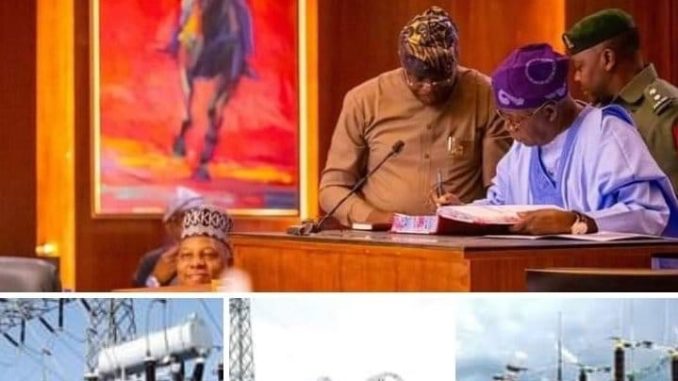President Bola Ahmed Tinubu has signed into law the Electricity Act 2023 which was initially passed by the lawmakers in July 2022.
It means that without a licence, anyone may construct, own, or operate an undertaking for generating electricity not exceeding 1 megawatt (MW) in aggregate at a site, or an undertaking for distribution of electricity not exceeding 100 kilowatts (KW) in aggregate at a site, or such other capacity as NERC may determine from time to time.
The Electricity Act will take the place of the 2005 Electricity and Power Sector Reform Act.
It establishes a framework to guide the Nigerian Electricity Supply Industry’s (NESI) post-privatization phase and to encourage private sector investment in the sector.
According to Nairametrics, the following are some of the functions that the Electricity Act seeks to guide:
State power over electricity
The national de-monopolization of electricity generation, transmission, and distribution in Nigeria empowers states, businesses, and individuals to generate, transmit, and distribute electricity.
States can issue licences to private investors to operate mini-grids and power plants within their borders under the Act. The Act, however, prohibits interstate and transnational electricity distribution.
NERC’s Authority
The Nigerian Electricity Regulatory Commission (NERC) will be able to regulate the electricity sector within Nigeria under the Electricity Act 2023, without prejudice to the states’ powers to make laws, create electricity markets, and regulate those markets.
READ ALSO:
- President Tinubu Meets With Governors For National Development
- Jimoh Ibrahim’s Financial Status Threatened as He Loses Appeal To Recover N69.4 Billion Assets Debt From AMCON
- Senates Approve 20 Special Advisers For Tinubu
The Act specifies how NERC can delegate regulatory authority to state regulators once they are established. NERC will continue to regulate electricity business conducted solely in those states until those states’ electricity market laws are passed.
For the time being, Lagos, Edo, and Kaduna states already have electricity market laws in place and can begin regulating their markets. However, NERC will regulate in states where such laws do not exist. NERC will continue to enforce cross-border regulations governing generation and transmission.
Legislators’ Roles
The Act empowers lawmakers to carry out oversight responsibilities and exercise control over the NESI through the Senate and House Committees on Power. This is to be done regardless of any government Ministry’s supervisory powers over government-owned enterprises or other entities operating in the Nigerian electricity supply industry.
Increasing the use of renewable energy
Electricity generation licensees are required by NERC to meet renewable generation obligations. The Act requires electricity-generating companies to either generate power from renewable energy sources, purchase power generated from renewable energy or purchase any instrument representing renewable energy generation.
The Electricity Act also requires distribution or supply licensees to meet renewable purchase obligations.


